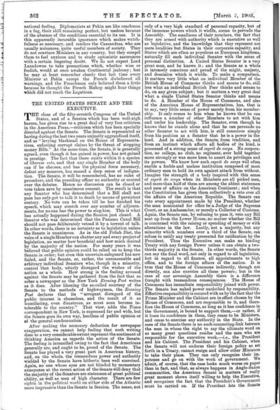THE RumouRs FROM CHINA.
WE are not able, unhappily, to believe very whole- heartedly in Lord Lansdowne as Foreign Secre- tary, but we find ourselves very often inclined strongly to sympathise with him. "The too vast orb of his fate," to use Matthew Arnold's fine expression, must press upon him so very heavily. As the Empire widens so do his cares ; and the Empire widens by well-nigh a kingdom a year. Not a week passes without some new call upon his powers of diplomatic prevision ; scarcely one without a demand, sometimes from two or three quarters at once, for a fresh display of armed force. One day he bears of an expedition to Kano, about which city he probably knows as little as any man in the street, but which is sure to attract jealous attention both in France and Germany ; and the next he is harassed with the dis- putes about the Hinterland of Aden, which wake up Con- stantinople and all the army of intriguers, Asiatic as well as European, whose focus is Yildiz Kiosk. He had hardly escaped, if he has escaped, from the weary and dangerous Venezuelan trouble when the Premier was obliged. to confess in the Commons that the Somaliland affair is growing and involves very serious issues—experts say it will cost ten millions before it is done, if it is done at all—and now there ale rumours from China which at least call for some careful and perplexing thought. The Standard's correspondents in Tientsin and Odessa, who seem to be both moderate and sensible, and whose accounts are at least coherent, affirm that the " Boxer " organisation is spreading fast ; that its head is Prince Than, who is accumulating forces in Shensi ; and that its objects, openly avowed by all within the organi- sation, are the capture of supreme power at Pekin and. the extirpation of the foreigner, always, be it remembered, possible if the movement covers the whole country. This might be taken to be merely an exaggeration of the un- doubted fact that Prince Tuan is relying for power, or, as it may be, for safety, upon the anti-foreign feeling, but that the statement is confirmed by men of large experience like Dr. Colthurst, and by the heads of the Propaganda alarmed for the safety of their converts, who, as in 1900, would share the fate of the Europeans. The correspondent at Tientsin, moreover, adds to his account a still more alarming expression of opinion derived from leading Chinese,—viz., that the Court of Pekin favours, instead of opposing, the movement, is appointing anti-foreign Viceroys, and is courting Ambassadors and Ambassadors' wives to lull them into a false security. That, of course, is denied peremptorily by all Chinese officials, and probably by most Ambassadors ; but it is at least possible that it is true. The policy of Pekin has usually been to yield for a time before any great internal movement ; and we have always been unable to believe that the Empress-Regent, who is still all-powerful in China, has pardoned the foreigners who passed on her the unparalleled insult of driving her from her capital, and yet were so afraid of her that they did not demand her expulsion from power. The Empress, of course, may have bowed to facts, as Hapsburg Emperors have 'done before now ; but if she entertains any thought of vengeance, the policy of letting the " Boxer " movement grow till she could. conveniently decide whether to repudiate or to lead it would be sure to attract a mind that may be great, but is certainly Oriental. The immensity of their dominion and of its population has - a profound effect upon the mind of Chinese statesmen, who regard even severe defeats as mere incidents in the unswerving career of their great Empire. We in Europe, with our habitual contempt for Asiatic feeling, have never quite realised what the Chinese must have felt about the last war of invasion, the horrors which accompanied it, and the great tribute exacted at its close ; and of all the Chinese the one most likely to feel deeply, and to conceal her feelings best till a convenient time, is the Empress-Regent.
There is food for meditation for Lord Lansdowne in the Chinese rumours even if he disbelieves them, as, with the slow imagination which seems to mark all our Ministers of State, he probably does ; and. as he meditates he will probably remember the great changes which the last few years have wrought in the British position in the Far East. We may not have lost strength there—indeed, we have not, for we have gained the Japanese Fleet, if not also the Japanese Army—but we have lost much of our freedom. We can no longer act alone. Any movement against foreigners in China would at once revive the European Concert, and if the Concert acted again it could not be contented a second time with a mere tribute. There would be no more money to get, and. any new claim to "compensation for the past and security for the future" must be satisfied in territory. As the distribution must be among jealous rivals, that opens up a far-reaching prospect of dispute; and even that is not all. Our new obligations to Japan have to be considered. The Japanese would doubtless be most loyal and side with the Europeans, but they cannot in their own interest allow a further serious advance by Russia ; and if Russia quarrels with them for interfering, or they quarrel with Russia for ad- vancing, we are bound in honour to make their cause our own. The complications might be, in the event of an out- break must be, most serious, and we have rather a habit of drifting till we find. ourselves in their midst. We are sailing everywhere amongst derelicts, and trust rather too completely to the skill of the steersman, whose search- light is sometimes out of order, and the strength of the ship, which is very great no doubt, but which may be over- taxed.
We shall be told by all manner of officials that what we have quoted as the latest rumours are only "the usual alarmist rubbish always pouring in from China." It may be so, and. we heirtily hope it is so, our one real interest in China being peaceful trade on all the waters of the Empire; but there are, with respect to news from Pekin, always two points to be remembered. One is that the force which drove the Chinese Army on the Legations still rules in China, is implicitly obeyed, and cannot have been con- ciliated. by the result of the war. Austria after her defeat grew friendly to Prussia, who defeated her. But suppose every Austrian for years after Sadowa had. found himself pillaged in order that a tribute to Berlin might be regularly paid. Would friendship have been so speedily renewed ? The other is that no European Foreign Office, except possibly the Russian, has ever succeeded, in spite of skilled agents and great resources, in feeling sure that it fully understood. the forces which impel the Chinese Court. The accredited. observers are blinded and the spies are terrorised. In the very last outrage, that of 1900, that Court may, for all the official proof in the possession of Europe, have been acting freely, or it may have been yielding to an irresistible current of national feeling. Diplomatists at Pekin are like coachmen in a fog, their skill remaining perfect, but useless because of the absence of the conditions essential to its use. It is this apparently incurable ignorance which makes watch- fulness so necessary, and renders the Cassandras, who are usually nuisances, quite useful members of society. They do not convince Minisiers in any country, but they compel them to feel anxious and to study optimistic assurances with a certain lingering doubt. We do not expect Lord Lansdowne to take precautions which, whether wise or foolish, would at once awaken Continental jealousy ; but he may at least remember clearly that last time every Minister at Pekin except the 'French disbelieved all warnings, and the Frenchman only believed them a little because he thought the French Bishop might hear things which did not reach the Legations.











































 Previous page
Previous page